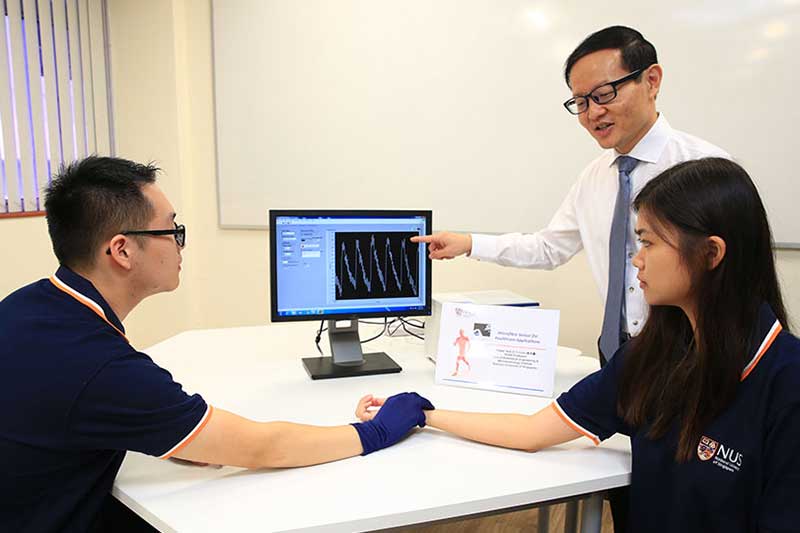
Above image: NUS
Engineering researchers developed a novel microfibre sensor for real-time
healthcare monitoring and diagnosis. The sensor can be woven into a glove to
monitor heart rate and blood pressure. / Credit: NUS
A research team from National University of Singapore (NUS)
has developed
a soft, flexible and stretchable microfibre sensor for real-time healthcare
monitoring and diagnosis.
The smart microfibre sensor developed by the NUS Engineering
team comprises a liquid metallic alloy, which serves as the sensing element,
encapsulated within a soft silicone microtube. This ultra-thin sensor with a
diameter of a strand of human hair is highly sensitive and has excellent
electrical conductivity and mechanical deformability.
Wearable and flexible technology has gained significant
interest in recent years, leading to tremendous progress in soft and wearable
sensors. In tandem with this trend, microfluidic devices using conductive
liquid metals have been increasingly employed as wearable pressure and strain
sensors.
However, current devices have various limitations – for
instance, they may not fit well on the skin or are uncomfortable to wear. The
new microfibre sensor can hardly be felt on the skin and conforms extremely
well to skin curvatures.
Applications – real-time
monitoring of pulse waveform and bandage pressure
“We have applied the sensor for real-time monitoring of pulse
waveform and bandage pressure. The results are very promising,” said Professor
Lim Chwee Teck from the Department of
Biomedical Engineering at NUS Faculty of Engineering, who is the leader of
the research team.
Doctors monitor vital signs like heart rate and blood
pressure when patients visit clinics. This requires the use of multiple pieces
of equipment such as heart rate and blood pressure monitors, which are often
bulky and may not provide instantaneous feedback. The new sensor functions like
a conductive thread, and can be easily woven into a glove, which can be worn by
doctors to track vital signs of patients in real-time.
This approach offers convenience and saves time for
healthcare workers, while patients can enjoy greater comfort.
The measurement of the pulse waveform can also be used to
determine stiffness in blood vessels. This could be beneficial for patients
suffering from atherosclerosis, which is the thickening and stiffening of the
arteries caused by the accumulation of fatty streaks. Over time, these streaks
accumulate into plaques which may completely block off blood flow or break
apart, resulting in organ failure or may trigger a heart attack or stroke.
Existing methods of detecting plaque in blood vessels – such
as computerised tomography scans and magnetic resonance imaging – require
expensive and bulky equipment. Such tests need to be done in hospitals by
trained medical professionals.
As plaque will change the stiffness of the blood vessel and
hence the pulse waveform, the novel sensor developed by the NUS Engineering
team could be easily used to detect plaque before it accumulates to a size big
enough to block or rupture the blood vessel.
Earlier this year, the NUS team published the development of
the microfibre sensor and its application for pulse monitoring in scientific
journals Proceedings of the National Academy of Sciences (PNAS)
and Advanced Materials Technologies, respectively.
Another clinical application of the smart microfibre sensor
is for the management of venous ulcers, which are caused by poor blood
circulation.
They occur when the veins in the legs are unable to push
blood back to the heart as well as they should. As blood pools in the veins,
there is increased pressure in the veins, causing progressive skin damage over
time.
Compression therapy is a common treatment for venous ulcer. This
consists of the application of bandages with varying amount of pressure on the
legs of patients for periods ranging from months to a year, depending on the
severity of the ulcers.
If the bandage is too tight, it could result in tissue
damage, but if the bandage is too loose, the healing could be ineffective.
Currently, healthcare workers tend to estimate the pressure in the bandage at
the point of application, based on training and experience.
Moreover, the pressure provided by the bandage could change
over time due to movements by the patient. Therefore, accurate and continuous
measurement of the bandage pressure in real-time is important to ensure that
healing takes place effectively.
The NUS Engineering team’s ultra-thin and flexible sensor
can be easily woven into bandages to monitor the pressure that is being
delivered and maintained. This could potentially improve the effectiveness of
the treatment and reduce the time required for healing.
In the future, patients could also track the bandage
pressure using an app, and the information could be shared with doctors who
could remotely monitor the progress of the treatment.
The team is currently collaborating with the Singapore
General Hospital to test the application of the microfibre sensor for bandage
pressure monitoring.
Commercialisation and further research
The team has filed a patent for its smart microfibre sensor.
Researchers are currently refining the sensor design and reducing the size of
its accessories to improve the user-friendliness of the device.
“Our microfibre
sensor is highly versatile, and could potentially be used for a wide range of
applications, including healthcare monitoring, smart medical prosthetic devices
and artificial skins. Uniquely designed to be durable and washable, our novel
invention is highly attractive for promising applications in the emerging field
of wearable electronics,” said Prof. Lim. The team continues to explore new
application of the sensor.
They are also keen to work with commercial partners to bring
their novel sensor to market.
















